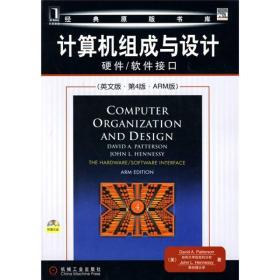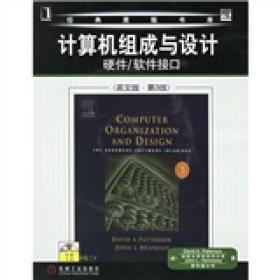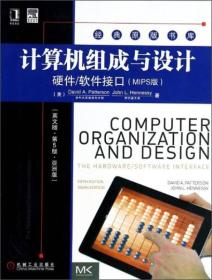
计算机组成与设计:硬件/软件接口(英文版·第4版·ARM版)
¥ 23.83 2.5折 ¥ 95 九五品
仅1件
北京海淀
认证卖家担保交易快速发货售后保障
作者[美]帕特林 著
出版社机械工业出版社
出版时间2010-04
版次1
装帧平装
货号A4
上书时间2024-11-18
- 在售商品 暂无
- 平均发货时间 15小时
- 好评率 暂无
- 最新上架
商品详情
- 品相描述:九五品
图书标准信息
- 作者 [美]帕特林 著
- 出版社 机械工业出版社
- 出版时间 2010-04
- 版次 1
- ISBN 9787111302889
- 定价 95.00元
- 装帧 平装
- 开本 16开
- 纸张 胶版纸
- 页数 689页
- 正文语种 英语
- 丛书 经典原版书库
- 【内容简介】
-
《计算机组成与设计:硬件/软件接口(英文版·第4版·ARM版)》采用了一个MIPS处理器来展示计算机硬件技术、流水线、存储器层次结构以及I/O等基本功能。此外。《计算机组成与设计:硬件/软件接口(英文版·第4版·ARM版)》还包括一些关于x86架构的介绍。
这本最畅销的计算机组成书籍经过全面更新,关注现今发生在计算机体系结构领域的革命性变革:从单处理器发展到多核微处理器。此外,出版这本书的ARM版是为了强调嵌入式系统对于全亚洲计算行业的重要性,并采用ARM处理器来讨论实际计算机的指令集和算术运算。因为ARM是用于嵌入式设备的最流行的指令集架构,而全世界每年约销售40亿个嵌入式设备。与前几版一样。
采用ARMv6(ARM11系列)为主要架构来展示指令系统和计算机算术运算的基本功能。
覆盖从串行计算到并行计算的革命性变革,新增了关于并行化的一章,并且每章中还有一些强调并行硬件和软件主题的小节。
新增一个由NVIDIA的首席科学家和架构主管撰写的附录,介绍了现代GPU的出现和重要性,首次详细描述了这个针对可视计算进行了优化的高度并行化、多线程、多核的处理器。
描述一种度量多核性能的独特方法——“Rooflinemodel”,自带benchmark测试和分析AMDOpteronX4、IntelXeo5000、SunUltraSPARCT2和IBMCell的性能。
涵盖了一些关于闪存和虚拟机的新内容。提供了大量富有启发性的练习题,内容达200多页。
将AMDOpteronX4和IntelNehalem作为贯穿《计算机组成与设计:硬件/软件接口(英文版·第4版·ARM版)》的实例。
用SPECCPU2006组件更新了所有处理器性能实例。 - 【作者简介】
-
DavidA.Patterson,加州大学伯克利分校计算机科学系教授。美国国家工程研究院院士。IEEE和ACM会士。曾因成功的启发式教育方法被IEEE授予JamesH.Mulligan,Jr教育奖章。他因为对RISC技术的贡献而荣获1995年IEEE技术成就奖,而在RAID技术方面的成就为他赢得了1999年IEEEReynoldJohnson信息存储奖。2000年他~13JohnL.Hennessy分享了JohnvonNeumann奖。
JohnL.Hennessy,斯坦福大学校长,IEEE和ACM会士。美国国家工程研究院院士及美国科学艺术研究院院士。Hennessy教授因为在RISC技术方面做出了突出贡献而荣获2001年的Eckert-Mauchly奖章.他也是2001年SeymourCray计算机工程奖得主。并且和DavidA.Patterson分享了2000年JohnvonNeumann奖。 - 【目录】
-
Contents
Prefacexv
CHAPTERS
ComputerAbstractionsandTechnology2
1.1Introduction3
1.2BelowYourProgram10
1.3UndertheCovers13
1.4Performance26
1.5ThePowerWall39
1.6TheSeaChange:TheSwitchfromUniprocessorstoMultiprocessors41
1.7RealStuff:ManufacturingandBenchmarkingtheAMDOpteronX444
1.8FallaciesandPitfalls51
1.9ConcludingRemarks54
1.10HistoricalPerspectiveandFurtherReading55
1.11Exercises56
Instructions:LanguageoftheComputer74
2.1Introduction76
2.2OperationsoftheComputerHardware77
2.3OperandsoftheComputerHardware80
2.4SignedandUnsignedNumbers86
2.5RepresentingInstructionsintheComputer93
2.6LogicalOperations100
2.7InstructionsforMakingDecisions104
2.8SupportingProceduresinComputerHardware113
2.9CommunicatingwithPeople122
2.10ARMAddressingfor32-BitImmediatesandMoreComplexAddressingModes127
2.11ParallelismandInstructions:Synchronization133
2.12TranslatingandStartingaProgram135
2.13ACSortExampletoPutItAllTogether143
:Thisiconidenti.esmaterialontheCD
2.14ArraysversusPointers152
2.15AdvancedMaterial:CompilingCandInterpretingJava156
2.16RealStuff:MIPSInstructions156
2.17RealStuff:x86Instructions161
2.18FallaciesandPitfalls170
2.19ConcludingRemarks171
2.20HistoricalPerspectiveandFurtherReading174
2.21Exercises174
ArithmeticforComputers214
3.1Introduction216
3.2AdditionandSubtraction216
3.3Multiplication220
3.4Division226
3.5FloatingPoint232
3.6ParallelismandComputerArithmetic:Associativity258
3.7RealStuff:FloatingPointinthex86259
3.8FallaciesandPitfalls262
3.9ConcludingRemarks265
3.10HistoricalPerspectiveandFurtherReading268
3.11Exercises269
TheProcessor284
4.1Introduction286
4.2LogicDesignConventions289
4.3BuildingaDatapath293
4.4ASimpleImplementationScheme302
4.5AnOverviewofPipelining316
4.6PipelinedDatapathandControl330
4.7DataHazards:ForwardingversusStalling349
4.8ControlHazards361
4.9Exceptions370
4.10ParallelismandAdvancedInstruction-LevelParallelism377
4.11RealStuff:theAMDOpteronX4(Barcelona)Pipeline390
4.12AdvancedTopic:anIntroductiontoDigitalDesignUsingaHardwareDesignLanguagetoDescribeandModelaPipelineandMorePipeliningIllustrations392
4.13FallaciesandPitfalls393
4.14ConcludingRemarks394
4.15HistoricalPerspectiveandFurtherReading395
4.16Exercises395
LargeandFast:ExploitingMemoryHierarchy436
5.1Introduction438
5.2TheBasicsofCaches443
5.3MeasuringandImprovingCachePerformance461
5.4VirtualMemory478
5.5ACommonFrameworkforMemoryHierarchies504
5.6VirtualMachines511
5.7UsingaFinite-StateMachinetoControlaSimpleCache515
5.8ParallelismandMemoryHierarchies:CacheCoherence520
5.9AdvancedMaterial:ImplementingCacheControllers524
5.10RealStuff:theAMDOpteronX4(Barcelona)andIntelNehalemMemoryHierarchies525
5.11FallaciesandPitfalls529
5.12ConcludingRemarks533
5.13HistoricalPerspectiveandFurtherReading534
5.14Exercises534
StorageandOtherI/OTopics554
6.1Introduction556
6.2Dependability,Reliability,andAvailability559
6.3DiskStorage561
6.4FlashStorage566
6.5ConnectingProcessors,Memory,andI/ODevices568
6.6InterfacingI/ODevicestotheProcessor,Memory,andOperatingSystem572
6.7I/OPerformanceMeasures:ExamplesfromDiskandFileSystems582
6.8DesigninganI/OSystem584
6.9ParallelismandI/O:RedundantArraysofInexpensiveDisks585
6.10RealStuff:SunFirex4150Server592
6.11AdvancedTopics:Networks598
6.12FallaciesandPitfalls599
6.13ConcludingRemarks603
6.14HistoricalPerspectiveandFurtherReading604
6.15Exercises605
Multicores,Multiprocessors,andClusters616
7.1Introduction618
7.2TheDif.cultyofCreatingParallelProcessingPrograms620
7.3SharedMemoryMultiprocessors624
7.4ClustersandOtherMessage-PassingMultiprocessors627
7.5HardwareMultithreading631
7.6SISD,MIMD,SIMD,SPMD,andVector634
7.7IntroductiontoGraphicsProcessingUnits640
7.8IntroductiontoMultiprocessorNetworkTopologies646
7.9MultiprocessorBenchmarks650
7.10Roo.ine:ASimplePerformanceModel653
7.11RealStuff:BenchmarkingFourMulticoresUsingtheRoo.ineModel661
7.12FallaciesandPitfalls670
7.13ConcludingRemarks672
7.14HistoricalPerspectiveandFurtherReading674
7.15Exercises674IndexI-1
CD-ROMCONTENT
GraphicsandComputingGPUsA-2
A.1IntroductionA-3
A.2GPUSystemArchitecturesA-7
A.3ScalableParallelism–ProgrammingGPUsA-12
A.4MultithreadedMultiprocessorArchitectureA-25
A.5ParallelMemorySystemG.6FloatingPointA-36
A.6FloatingPointArithmeticA-41
A.7RealStuff:TheNVIDIAGeForce8800A-46
A.8RealStuff:MappingApplicationstoGPUsA-55
A.9FallaciesandPitfallsA-72
A.10ConcludingRemarksA-76
A.11HistoricalPerspectiveandFurtherReadingA-77
ARMandThumbAssemblerInstructionsB1-2
B1.1UsingThisAppendixB1-3B1.2SyntaxB1-4B1.3AlphabeticalListofARMandThumbInstructionsB1-8B1.4ARMAssemblerQuickReferenceB1-49B1.5GNUAssemblerQuickReferenceB1-60
ARMandThumbInstructionEncodingsB2-2
B2.1ARMInstructionSetEncodingsB2-3
B2.2ThumbInstructionSetEncodingsB2-9
B2.3ProgramStatusRegistersB2-11
InstructionCycleTimingsB3-2
B3.1UsingtheInstructionSetCycleTimingTablesB3-3B3.2ARM7TDMIInstructionCycleTimingsB3-5B3.3ARM9TDMIInstructionCycleTimingsB3-6B3.4StrongARM1InstructionCycleTimingsB3-8B3.5ARM9EInstructionCycleTimingsB3-9B3.6ARM10EInstructionCycleTimingsB3-11B3.7IntelXScaleInstructionCycleTimingsB3-12B3.8ARM11CycleTimingsB3-14
CTheBasicsofLogicDesignC-2
C.1IntroductionC-3
C.2Gates,TruthTables,andLogicEquationsC-4
C.3CombinationalLogicC-9
C.4UsingaHardwareDescriptionLanguageC-20
C.5ConstructingaBasicArithmeticLogicUnitC-26
C.6FasterAddition:CarryLookaheadC-38
C.7ClocksC-48
C.8MemoryElements:Flip-Flops,Latches,andRegistersC-50
C.9MemoryElements:SRAMsandDRAMsC-58
C.10Finite-StateMachinesC-67
C.11TimingMethodologiesC-72
C.12FieldProgrammableDevicesC-78
C.13ConcludingRemarksC-79
C.14ExercisesC-80
DMappingControltoHardwareD-2
D.1IntroductionD-3
D.2ImplementingCombinationalControlUnitsD-4
D.3ImplementingFinite-StateMachineControlD-8
D.4ImplementingtheNext-StateFunctionwithaSequencerD-22
D.5TranslatingaMicroprogramtoHardwareD-28
D.6ConcludingRemarksD-32
D.7ExercisesD-33
ADVANCEDCONTENT
Section2.15CompilingCandInterpretingJavaSection4.12AnIntroductiontoDigitalDesignUsingaHardwareDesignLanguagetoDescribeandModelaPipelineandMorePipeliningIllustrationsSection5.9ImplementingCacheControllersSection6.11Networks
HISTORICALPERSPECTIVES&FURTHERREADING
Chapter1ComputerAbstractionsandTechnology:Section1.10Chapter2Instructions:LanguageoftheComputer:Section2.20Chapter3ArithmeticforComputers:Section3.10Chapter4TheProcessor:Section4.15Chapter5LargeandFast:ExploitingMemoryHierarchy:Section5.13Chapter6StorageandOtherI/OTopics:Section6.14Chapter7Multicores,Multiprocessors,andClusters:Section7.14AppendixAGraphicsandComputingGPUs:SectionA.11
TUTORIALS
VHDL
Verilog
SOFTWARE
XilinxFPGADesign,SimulationandSynthesisSoftwareQEMUhttp://www.nongnu.org/qemu/about.html
GlossaryG-1IndexI-1FurtherReadingFR-1
点击展开
点击收起
相关推荐
— 没有更多了 —



















以下为对购买帮助不大的评价